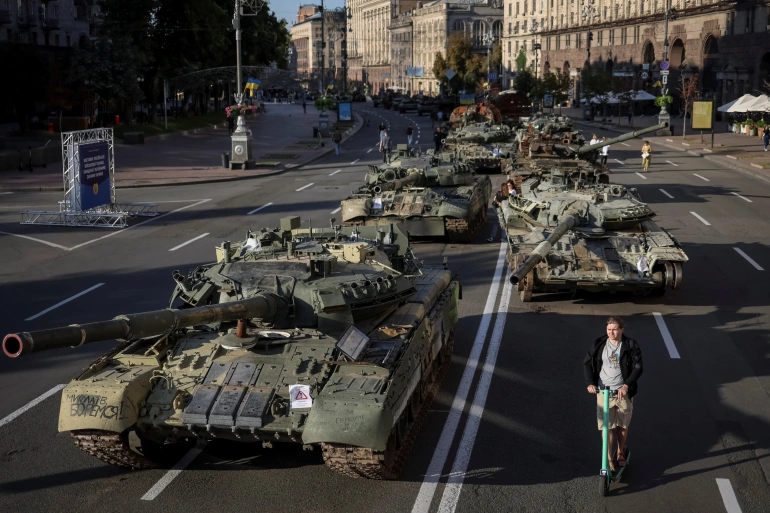War in Ukraine rages on, desolating towns.
Destroyed Russian tanks in Kyiv
August 25, 2022
As August wears on, the fighting in Ukraine shows no signs of stopping whatsoever. The Russian military seems to only be increasing its commitments to its own invasion effort, NATO and the United States’ allies only ramping up the already substantial support given to Ukraine, and in the halls of the UN, the shouting and bickering never seems to end, even as the already sizable death count only increasingly grows.
The war in Ukraine officially began on February 24th, 2022, when the Russian military launched a preemptive strike on the country with airstrikes, missile attacks, paratrooper assaults, and naval invasions on the Ukrainian coast, as well as invasion from Ukrainian claimed Russian Crimea. The conflict, though, can be traced back to the Euromaidan protests, and subsequent coup of the Ukrainian government, which ousted the former Pro-Russian government of Ukraine, and lead to Russia seizing Ukrainian Crimea, and marking a stark shift in relations from the previous positive ones that existed under the former Pro-Russian government. With these incidents and events, it was thought that Russia had seized enough, until their attack in February.
The war has been distinctly defined by the shocking incompetence of the Russian military throughout their operations. From the battle near the site of the Chernobyl Nuclear disaster, to the VDV’s (Russia’s special paratrooper forces) encirclement and destruction at the Kyiv airport, to Ukraine’s repulsion at the very gates of Kyiv, the war has shown that the modern Russia and her military are a far cry from the days of the USSR, and thus far it can be said that Ukraine is winning the war in near entirety and totality.
The war has also led to a rise in Anti-Russian sentiment across the world, with sanctions and embargoes being put against Russia, crushing the Russian economy and leading to horrendous amounts of inflation. Noticeably, calls for the downfall of the incumbent United Russia party in Russia, and for the downfall of its leader and president of Russia, Vladimir Putin, has risen, and even in Russia itself, protests have risen, protests that have largely been suppressed by the increasingly authoritarian and despotic regime of Vladimir Putin.
A fear that has risen as a result of the war, is a fear of war between NATO and Russia, which would be defined by the hurling of nuclear weapons. In an interview with a concerned citizen, 3 questions concerning the war were asked.
Q: “What do you think of the war?”
A: “In general, I don’t think war is very good, I think we should come together to solve our differences instead of shooting one another.”
Q: “Do you think the war could escalate into World War 3 or Nuclear war?”
A: “I think it’s always a possibility due to the convoluted nature of the alliances of both Russia and NATO.”
More recently, Russia has once again attacked a nuclear installation, similar to their attack on Chernobyl in March. In the region of Zaporizhia, Russia has laid siege to the area and region, putting into jeopardy the Zaporzhian nuclear power plant. Ukraine is no stranger to nuclear disasters, as can be exemplified by the Chernobyl nuclear disaster (that was mentioned before), and it is very much aware of the threat that is presented by nuclear power, an otherwise clean energy source that can be threatened by war and natural disasters. If the Zaporizhia plant were to be damaged or suffer a meltdown, the resulting nuclear disaster would be catastrophic, and devastating to all of Europe. It is such that President Zelensky of Ukraine has called for action to be taken to protect the aforementioned nuclear power plant. The war shows no signs of ending, and updates continue to come in.


